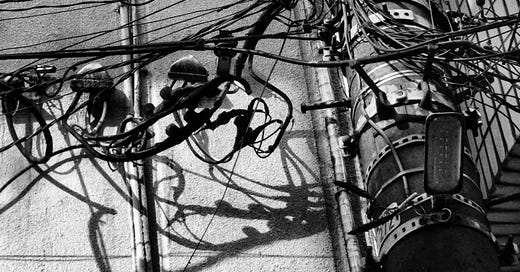“Try harder,” you tell yourself, assuming that this directive will be taken seriously by the person you are five minutes from now. However, it’s not—that future person has no interest in the present you, who is, to them, a barely recognizable figure from a distant past.
“Try harder,” you tell yourself, assuming that the process that feels effortful is the one that creates results. However, it’s not, in this case—the feeling of effort is being created by superfluous action. You are furrowing your brow more vigorously in order to think better thoughts.
“Try harder,” you tell yourself, as a way of dissuading yourself from doing something you’re afraid of doing by making it more unpleasant.
“Try harder,” you tell yourself, narrowing your focus and failing to notice that you’re not doing something much more important.
“Try harder,” you tell yourself, because you feel like you don’t deserve a reward unless you have done something that, to an outside observer, would look like difficult work. For some reason, you feel that it’s cheating to produce something of value with ease, especially if you’re rewarded for it.
“Try harder,” you tell yourself, cleverly avoiding the things that you’re naturally good at, which come easy, in favor of the things you’re naturally bad at, which are hard.
“Try harder,” you tell yourself, assuming that you’re perfecting the thing you’re working on, rather than overworking it, ruining its natural charm.
“Try harder,” you tell yourself, neglecting the elegant solution that could’ve come from an earnest attempt to be lazy.
“Try harder,” you tell yourself, wringing some diminishing returns out of the existing mediocre process, instead of finding another better process.
“Try harder,” you tell yourself, in an attempt to act like you’re motivated to do the task in front of you, when, actually, you are guilty about not really caring about it at all, and it’s easier to yell at yourself than admit this inconvenient feeling.
“Try harder,” you tell yourself, because you’d rather not admit that you should instead seek help from someone who’s better than you at doing this thing. Or that maybe they should be in charge of this job, not you.
“Try harder,” you tell yourself, assuming that the voice in your head will reach the parts of you that are really in control in this moment. But it doesn’t—currently, the voice in your head is like a young child who doesn’t realize that their video game controller is unplugged.
This post was inspired by a remark made by Misha Glouberman. Photo credit goes to Daido Moriyama.




It would be interesting to see the opposite for each one of these. If you don't tell yourself to "try harder" in these specific situations, what are the alternative good strategies?
Very relatable. Thank you 🙏
The trouble with 'Try harder!' is that there is always another message in the subtext which gets reaffirmed, bashed around your head... that subliminal message is: "I'm not good enough".... "still not good enough".... "never good enough, no matter how hard I try."